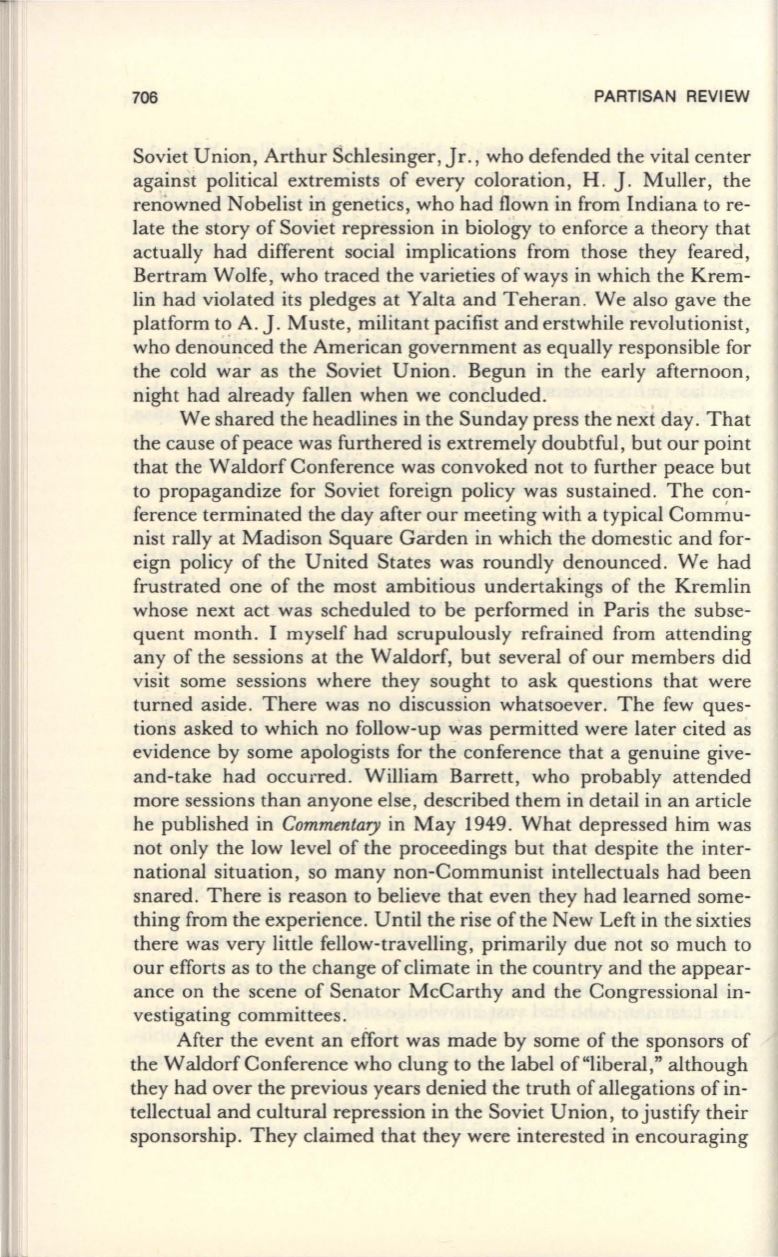
706
PARTISAN REVIEW
Soviet Union, Arthur Schlesinger, Jr., who defended the vital center
against political extremists of every coloration , H . J . Muller, the
renowned Nobelist in genetics, who had flown in from Indiana tore–
late the story of Soviet repression in biology to enforce a theory that
actually had different social implications from those they feared ,
Bertram Wolfe, who traced the varieties of ways in which the Krem–
lin had violated its pledges at Yalta and Teheran. We also gave the
platform to A. J. Muste , militant pacifist and erstwhile revolutionist,
who denounced the American government as equally responsible for
the cold war as the Soviet Union . Begun in the early afternoon ,
night had already fallen when we concluded.
We shared the headlines in the Sunday press the next day . That
the cause of peace was furthered is extremely doubtful, but our point
that the Waldorf Conference was convoked not to further peace but
to propagandize for Soviet foreign policy was sustained. The con–
ference terminated the day after our meeting with a typical
Com~u
nist rally at Madison Square Garden in which the domestic and for–
eign policy of the United States was roundly denounced . We had
frustrated one of the most ambitious undertakings of the Kremlin
whose next act was scheduled to be performed in Paris the subse–
quent month . I myself had scrupulously refrained from attending
any of the sessions at the Waldorf, but several of our members did
visit some sessions where they sought to ask questions that were
turned aside. There was no discussion whatsoever. The few ques–
tions asked to which no follow-up was permitted were later cited as
evidence by some apologists for the conference that a genuine give–
and-take had occurred. William Barrett, who probably attended
more sessions than anyone else, described them in detail in an article
he published in
Commentary
in May 1949. What depressed him was
not only the low level of the proceedings but that despite the inter–
national situation, so many non-Communist intellectuals had been
snared . There is reason to believe that even they had learned some–
thing from the experience . Until the rise of the New Left in the sixties
there was very little fellow-travelling, primarily due not so much to
our efforts as to the change of climate in the country and the appear–
ance on the scene of Senator McCarthy and the Congressional in–
vestigating committees.
After the event an effort was made by some of the sponsors of
the Waldorf Conference who clung to the label of"liberal," although
they had over the previous years denied the truth of allegations of in–
tellectual and cultural repression in the Soviet Union, to justify their
sponsorship. They claimed that they were interested in encouraging


